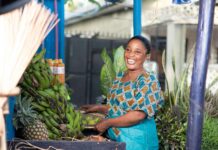A new annual event examines root and soil health’s importance for food security, livelihoods and climate resilience and marks the launch of a community for root and soil health action.
The first One Earth Root and Soil Health Forum took place on March 1. Over 800 people attended to discuss how to unlock the potential of better soil and root health to help transform food systems. The Forum brought together experts from farming, international organizations, NGOs, academia and the public and private sectors. Together they called for collective action in science and technology targeting the early stages of plant growth.
The main emphasis this year was on Africa, which has around 60% of the world’s uncultivated arable land. However, parallel workshops focusing on Turkey, the Middle East, Sub-Saharan Africa and South Africa enabled tailored discussions in regional languages. Plenary keynote speakers were Erik Fyrwald (Syngenta Group CEO and Chairman of the Syngenta Foundation for Sustainable Agriculture) and Dr Ismahane Elouafi (Chief Scientist at the UN Food and Agriculture Organization).
Erik Fyrwald underlined that “everything starts with soil. It is the foundation of productive farming practices – with healthy soil, you can have healthy plants, healthy people and a healthy planet. By acting on soil health through regenerative agriculture practices, we are acting on climate change, biodiversity loss and food security, as well as improving farmer livelihoods. The One Earth Soil and Root Health Forum helps an international community shift towards achieving this – together.”
Dr Ismahane Elouafinoted that“healthy soils are the foundation for agriculture, as they provide 95% of our food. Soils also provide fuel, fiber and medical products, and play a key role in the carbon cycle, storing and filtering water, and improving resilience to floods and droughts.”
Speaking on the opening panel, Michael Misiko, Africa Agriculture Director of The Nature Conservancy, noted that “climate change is inseparable from the life and health of our soils and the roots that must thrive within them.”
Underlining the importance of awareness raising action, Dr Abdelfattah Dababat (Senior Scientist, Country Representative for Turkey, CIMMYT) underlined that “growers basically do not recognize soil/root health to be a problem. Most of them are not aware of the root rot diseases and soil health issues in their fields, affecting their yield. This is why the term “hidden enemy” applies perfectly. Root and soil health management is therefore, not practiced and those yield losses are simply accepted.”
Speakers also underlined the link between soil and root health and the long-term economic productivity and the welfare of societies. Other points raised included technologies measuring soil health and their role in enabling informed decision-making by farmers and scientists. The importance of empowering smallholders and enabling access to modern technologies was also underlined as was the importance of public-private sector collaboration in achieving this.
Speakers in the opening panel were Dr. Michael Misiko (Africa Agriculture Director, TNC), Mandla Nkomo (Managing Director for Southern Africa, Solidaridad), Prof Richard Sikora (Former Head Soil-Ecosystem Phytopathology, University of Bonn) and Steve Maund (Head CP R&D Sustainability, Syngenta). The panel was moderated by Redi Tlhabi (member of the UN Global Journalists Corps, author and award-winning broadcaster).
Speakers in the concluding panel were Dr. Abdelfattah A. Dababat (Senior Scientist, Country Representative for Turkey, CIMMYT), Debisi Araba (Managing Director, African Green Revolution Forum), Yemi Akinbamijo (Executive Director, Forum for Agricultural Research in Africa), Azariah Soi, (President, African Seed Trade Association) and Luc Henry (Seedcare Head AME, Syngenta). The panel was moderated by Neva Sadikoglu-Novaky (Business Sustainability Lead at Syngenta).
Health underfoot: why roots and soil are important
Around 95% of the food we eat grows in the earth. However, more than one-third of the world’s soils are degraded; without rapid action, this figure could rise to 90% by 2050. Soil erosion decreases the water, nutrients and root-space available to plants. Healthy roots enable better use of nutrients and water. They help produce more shoots and leaves from each seed, enabling farmers to produce more food and soil to capture more carbon. Healthy roots also help tackle soil erosion. Soil and root health help mitigate climate change. More carbon already resides in soil than in the atmosphere and all plant life combined. Studies show that there are 2,500 billion tons of carbon in soil, compared with 800 billion tons in the atmosphere and 560 billion tons in plant and animal life. Healthier soil can store even more. Healthy plants with good roots capture further carbon from the atmosphere.
The Forum was organized by Agventure, Association for Strengthening Agricultural Research in Eastern and Central Africa (ASARECA), African Seed Trade Association (AFSTA), Forum for Agricultural Research in Africa (FARA), International Maize and Wheat Improvement Center (CIMMYT), Rizobacter, Seed Co Limited, Syngenta Seedcare, the Syngenta Foundation for Sustainable Agriculture, Solidaridad and The Nature Conservancy (TNC). https://soilroothealth.com/








